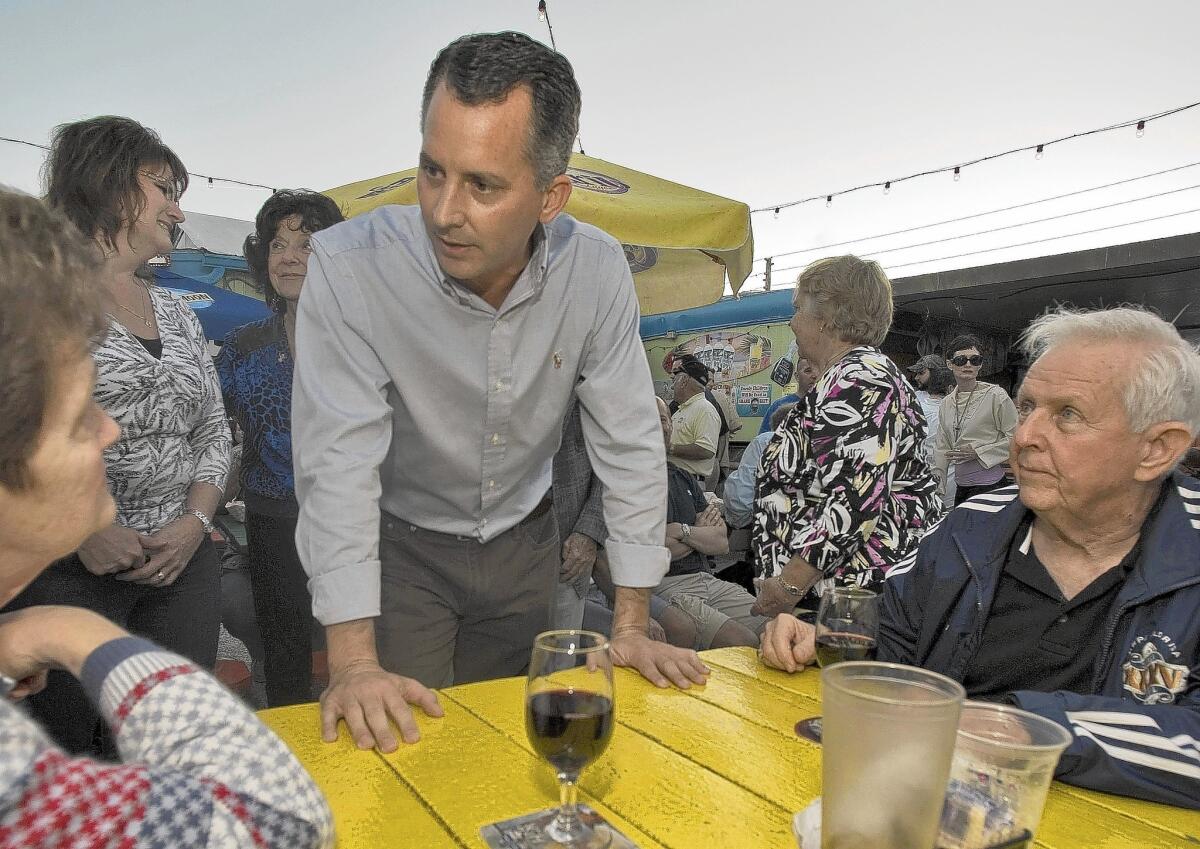In Florida, a local race with national scripts

- Share via
CLEARWATER, Fla. — The two major political parties look at off-cycle congressional elections the way great powers eye wars in small lands — as a chance to test weapons and tactics they’ll soon deploy elsewhere.
That’s why many of the ads running on television here — for a race to fill a congressional vacancy representing a swath of Florida’s Gulf Coast — will probably sound familiar soon to voters in competitive districts nationwide.
“Cut spending, stop Obamacare,” proclaim the spots supporting Republican David Jolly.
“I’ll bring Republicans and Democrats together,” Democrat Alex Sink promises in her ads, while simultaneously accusing Jolly of endangering Social Security, Medicare and abortion rights.
The ads illustrate the two parties’ contrasting strategies. But they also reflect a trend toward the homogenization of campaigns as national political parties and outside groups increasingly dominate competitive races.
The two parties’ congressional campaign committees, along with allied “super PACs,” have already spent at least $8.6 million, mostly on television and radio ads here, according to the Center for Responsive Politics, briefly making this the country’s hottest political territory. Hundreds of thousands have been poured into robocalls and direct mail. Overall spending on the race will top $12 million, disclosure reports indicate.
Outside groups have outspent the two candidates on TV by roughly 3 to 1, according to a recent compilation of disclosure reports by the Tampa Bay Times, as they’ve blanketed Florida’s largest media market to reach the relative handful of voters who live in the 13th Congressional District and will vote in an off-season election.
The outsized impact of outside groups has at times made the candidates seem like secondary players following scripts designed in Washington.
Prominent local issues — including a huge increase in federal flood insurance rates that both sides say is a top concern of area voters — have had little role in the TV ad wars focused on national themes.
For Republicans, the strategy aims at motivating core conservative voters — a sharp reversal from last year’s vow to try to broaden the party’s appeal. They’ve kept a singular focus on President Obama’s healthcare law, which Jolly has attacked in nearly all of his ads and public appearances.
Democrats, who need to make up for the typically low turnout of young and minority voters in midterm elections, hope to attract independents and Republican moderates by playing on the perceived hyperpartisanship of the House GOP.
But they’ve also pushed hard on the “war on women” theme familiar from 2012, attacking Jolly’s opposition to both federal equal pay legislation and the Supreme Court’s Roe vs. Wade decision that legalized abortion.
The district, which covers miles of beaches and suburban sprawl on the peninsula between Tampa Bay and the gulf, provides an attractive testing ground for both sides. Its electorate has a nearly even division among Democrats, Republicans and independents — a balance rarely found anymore in congressional districts.
The voters bear little resemblance to the Obama-era Democratic coalition of young people and minorities. Instead, the population is heavy on middle-class retirees from the Midwest. Its demographics skew white and old, even by Florida standards. Such older, moderate whites, however, are the type of voters who could decide many closely fought contests this year.
“We’re the lead-off hitter for the whole country,” said Susan MacManus, political science professor at the University of South Florida in Tampa. “What you see here, you’ll see throughout the whole year.”
Democrats started this contest with high hopes. When Republican Rep. C.W. Bill Young, who had represented the area in Congress for 40 years, died in October, the government shutdown had pushed GOP standing to a nadir. Obama carried the district narrowly in 2012, indicating that a Democrat could win.
In Sink, who moved into the district from the other side of Tampa Bay, Democrats had a well-known name — a former bank executive who had served as the state’s elected chief financial officer and then narrowly lost a race for governor in 2010.
Although prone to gaffes on the stump, Sink has proven popular over the years with the area’s voters. Her profile as a self-proclaimed “moderate, fiscally conservative Democrat” fits the district politically. She also had a large network of donors and quickly built up a significant financial advantage.
Jolly, a former aide to Young, first had to fight through an expensive primary. He also carries the burden of having passed through Washington’s revolving door. Democratic ad makers have given him a new first name in their spots, referring constantly to “Lobbyist David Jolly.”
Nonetheless, the healthcare law’s problems and the district’s even partisan divide have kept the contest close. By the time absentee balloting began on Feb. 7, officials in both parties were describing the race as too close to predict. Complicating matters further, a Libertarian candidate, Lucas Overby, who has been included in candidate debates, could siphon votes from both sides.
News media and university polls have shown Sink with a small lead, and with roughly 113,000 ballots cast so far, Republicans have fallen short of the margin they typically get here from absentee voters.
If Sink wins, Democrats may credit the position she has taken in defense of the healthcare law. “We can’t go back to letting insurance companies do whatever they want,” she declared in an ad unveiled in early February. “Instead of repealing the healthcare law, we need to keep what’s right and fix what’s wrong.”
Many of the district’s voters share that view, according to a poll by St. Leo University — a Catholic college northeast of Tampa. Of the likely voters surveyed in mid-February, 40% favored keeping the healthcare law but amending it, and 17% said they favored keeping the law as it is. On the other side, 20% said they wanted to repeal the law “entirely and go back to how things were,” and 21% favored repealing it and replacing it with another, unspecified plan.
“It’s rarely the first thing that comes up” in conversation with voters, Sink said in an interview, but “when it does, I have as many people saying, ‘Please don’t let them repeal Obamacare’” as opposing the law.
Nonetheless, she has avoided talking too much about the issue. In the closing weeks of the campaign, Democrats have focused, instead, on painting Jolly as too conservative on issues from abortion to Social Security.
Jolly, who emphasized his conservatism during the primary, has sought to move back toward the center on some issues and has indignantly denied Democratic charges that he favors privatizing Social Security, airing an ad with testimonials from his aunt and 72-year-old mother.
“You’ve been misrepresenting my position,” he told Sink during a recent debate. But he has left enough ambiguity about that position to keep the attacks coming, saying he wants to “guarantee” the programs, but that they need to be made “actuarially sound.” He has offered few specifics.
Both sides have been buffeted by the outside attacks. “It’s a little nerve-wracking,” said Sink, adding with resignation that “it is what it is.”
Says MacManus, “the candidates have lost control of their message with all this outside money” dominating the campaign. Florida’s message for the rest of the country, she added, is “it’s just going to be another long, hard, negative year.”
More to Read
Sign up for Essential California
The most important California stories and recommendations in your inbox every morning.
You may occasionally receive promotional content from the Los Angeles Times.











